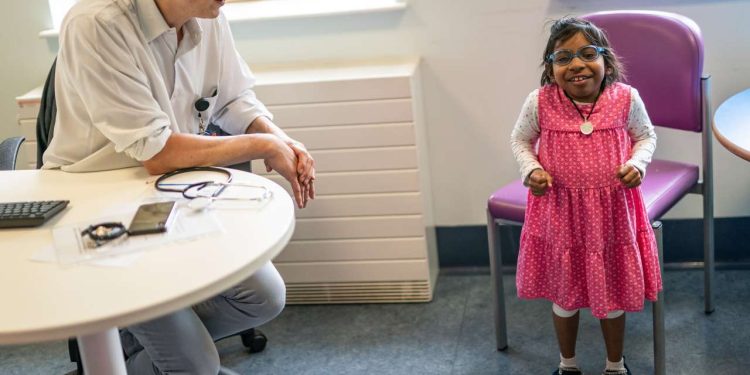An eight-year-old girl of Indian origin, named Aditi Shankar, has become the first person to receive a transplant without requiring a lifelong dependence on drugs, in a historic milestone for the United Kingdom’s National Health Service (NHS). This groundbreaking achievement follows the reprogramming of Aditi’s immune system by medical professionals, following her kidney transplant.
Aditi, who suffers from a rare genetic condition, underwent a kidney transplant and received a stem cell transplant using bone marrow generously donated by her mother, Divya. In a remarkable act of maternal love and support, Divya also donated one of her kidneys to save her daughter’s life.
According to Professor Stephen Marks, the Clinical Lead for Renal Transplantation at GOSH and Professor of Paediatric Nephrology and Transplantation at the University College London Great Ormond Street Institute of Child Health, this remarkable medical achievement marks a significant milestone in his 25-year career. Aditi Shankar’s case is the first instance in which he has witnessed a kidney transplant recipient not requiring immunosuppressive drugs.
Professor Marks expressed his hopes that their research would open up new possibilities for more children, like Aditi, for whom kidney transplantation was previously deemed unviable. He was quoted by PTI as saying, “We hope that our research will provide the option for more children, like Aditi, for whom kidney transplant was not previously an option, to have the opportunity to have a life-changing kidney transplant.”
Doctors attribute Aditi’s unique success to the fact that she received her mother’s bone marrow, six months before undergoing a kidney transplant due to severe, irreversible kidney failure. This strategic approach effectively reprogrammed her immune system to align with her donor kidney, preventing the transplanted organ from attacking Aditi’s body.
Aditi’s father, Uday Shankar, shared their family’s journey, revealing that for the past three years, Aditi’s vitality had been compromised by dialysis. However, after her kidney transplant, there was an almost instantaneous improvement in her energy levels. Mr. Shankar expressed profound gratitude for the gift of organ donation, noting, “We take our organs for granted, but we all have such a gift in us.”
He further elaborated on the positive changes in Aditi’s life, stating, “For the past three years, she has been restricted with a Hickman line, a tube that delivers treatments and takes blood samples directly from a vein, and all she wanted to do was for her line to go away so she could go and splash in the water. She is now starting swimming lessons.”
Typically, individuals who undergo organ transplants need to take immunosuppressive medications for the duration of their kidney transplant. In the case of using the same donor for both bone marrow and kidney transplants, the immune system is reprogrammed to align with the new kidney, significantly reducing the risk of rejection.
As the first such case in the UK, Aditi’s successful treatment is expected to pave the way for further investigations into the potential use of a bone marrow transplant followed by a kidney transplant from the same living donor to treat more severely ill children and adults suffering from kidney failure and other conditions. However, it’s important to note that this approach will be reserved for seriously ill patients who have no other viable alternatives, as the risks associated with a double transplant are higher than those of a standard kidney transplant.
Dr. Giovanna Lucchini, the bone marrow transplant consultant, and Dr. Austen Worth, an immunology consultant, highlighted the challenges faced by medical teams in addressing the scientific, ethical, and practical aspects of Aditi’s case.
They expressed their immense satisfaction with Aditi’s progress and their pride in sharing this groundbreaking success with her and her family. They are already engaged in ongoing efforts to leverage this breakthrough for further research that can benefit more families.
Great Ormond Street Hospital, the UK’s largest centre for paediatric kidney transplantation and stem cell transplantation, also leads pioneering research projects in this field.











